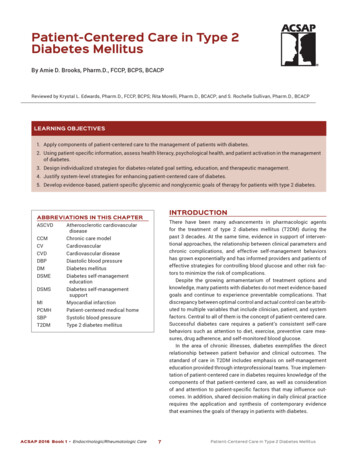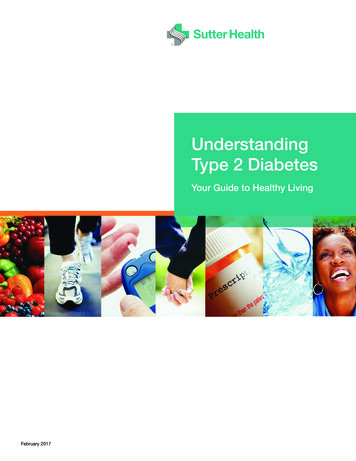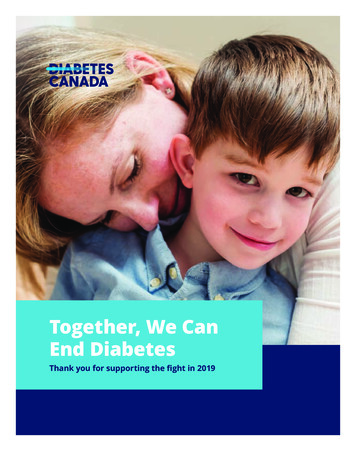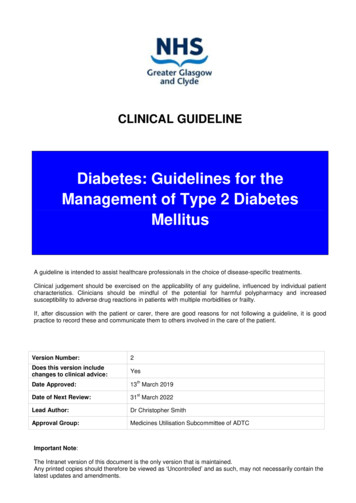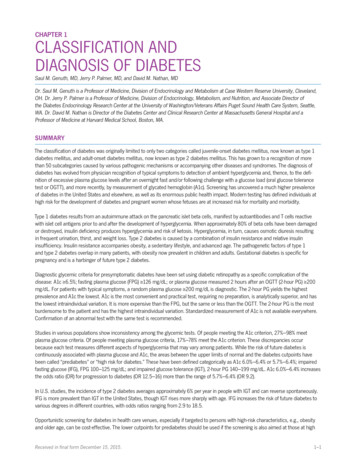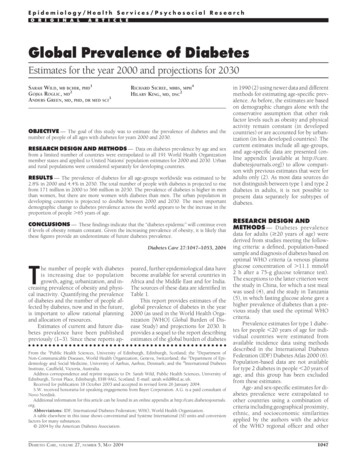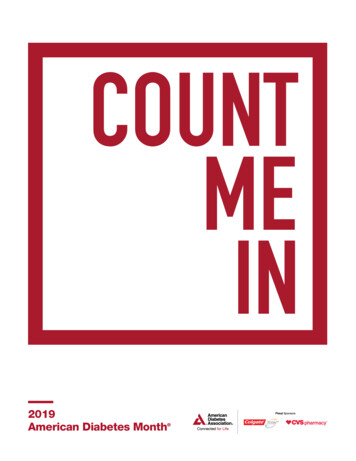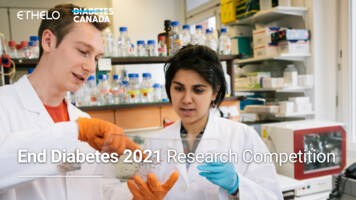
Transcription
End Diabetes 2021 Research Competition
Executive SummaryFrom February 10, to February 28, 2021, Diabetes Canada used an interactive portal powered by Ethelo to gather input from key stakeholders in order tohelp shape their next research funding competition.The engagement gathered input from 360 participants across Canada, including 90 researchers, and270 members of the public.Key Findings Included.In both votes and comments, it was clear that all demographic groups agreed that a Research focus was most important, and participants favoured a focuson Clinical Research and Biomedical Research. When asked why they voted in favour of Reasearch Focus, participants generally commented that focusingon Research would in turn help support Capacity Building, Impact, and Benefits.Impact and Benefits was identified as the second most important focus area and within this scope, Foundational Knowledge Development was voted foras a top priority. There was general agreement that focusing on the Commercial Potential to Make Therapies Accessible was the lowest priority. Whenasked why they would prioritze a focus on Impact and Benefits, participants commented that it's hugely important for donors, patients, and thoseimpacted by diabetes get to see and feel the impact of Diabetes Canada's funding.Many participants emphasized the notion that all three potential focuses are hugely important.Capacity Building was agreed upon as the least important area of focus, though many advocated for its various priorities in comments, and it was stillgenerally looked upon as a strong option. Within this scope, Future Scientists were identified as the highest priority, and Senior Scientists wereidentified as the lowest.2
Executive SummaryWhen asked if there was anything else they wanted Diabetes Canada to consider as investment priorities were set, several themes emerged in comments.Firstly, that education and communication is key. Education surrounding nutrition, activity, and environment can make all the difference to those who areimpacted by diabetes. Additionally, communicating new research studies, potential breakthroughs and successes helps bring hope to the community, andemphasizes the impact of the work Diabetes Canada is doing.Secondly, it was identified that Type 1 Diabetics often feel stigmatized in the community, and it is felt that a greater focus is needed on initiatives thathighlight it.Finally, participants emphasized that a well-rounded view of diabetes and how it is impacted by and impacts mental health, weight stigma, and socioeconomic factors is important when striving towards the goal of improving the lives of those affected by diabetes.3
OverviewAreas of High Support and Consensus*Research FocusBiomedical Research81% Support85% Consensus ScoreClinical Research81% Support85% Consensus Score75% Support75% Consensus ScoreFuture Scientists72% Support75% Consensus ScoreMid-Career Researcher68% Support73% Consensus ScoreImpacts and BenefitsDevelopment of Foundational KnowledgeCapacity Building*The Consensus Score takes into account all participant votes, in addition to factoring in overall support. It showcases how much broad support is predicted to surround a particular option. The higher the Consensus Score, the morebroadly supported the option is liable to be.4
OverviewAreas of Potential Polarization*Research FocusPopulation Health Research65% Support31% Conflict ScoreImproving JEDI63% Support35% Conflict ScorePolicy Development68% Support32% Conflict ScoreResearch Teams67% Support35% Conflict ScoreSenior Researcher60% Support28% Conflict ScoreImpacts and BenefitsCapacity Building*This was a generally low conflict decision, with participants largely voting in support of each funding priority.The Conflict Score is a measure of how much polarization a particular option is liable to have. The higher the conflict score, the higher the proportion of conflicting views. For example, if half of participants voted in total support ofsomething, and the other half voted in total opposition, it would result in a Conflict Score of 100%5
Impacts and Bene6
Viewers: 826 Total Participants: 360 Participants - Researcher Dataset: 90 Biomedical Researcher/Research Trainee: 50 Clinical Researcher/Research Trainee: 24 Health Systems & Services Researcher/Research Trainee: 8 Population Health Researcher/Research Trainee: Representative of a research funding organization: 62Participants - Public Dataset: 270 Donor to Diabetes Canada: 40 Volunteer for Diabetes Canada: 15 Person living with diabetes or family member/caregiver: 177 Government Official/policy maker: 3 Other: 35 Page Views: 5,873 Average Visit Length: 7 minutes
Research Focus8
Research FocusOverview Clinical Research and Biomedical Research wereclearly favoured and highly supported by bothAll RespondentsBiomedical Research81%Clinical Research80%Researchers and the Public In both groups, support for the other two choiceswas still over 60% Research Focus was considered to be the mostimportant, and to contain the highest priorities69%Health Systems and Services Researchacross all groups65%Population Health Research0%23%45%68%90%9*The x-axis of the chart indicates participant support for each initiative. Support is the average value of votes, where the value of a totally opposing vote is 0 and a totally supportive vote is 100.
Research FocusComparative AnalysisResearchersMembers of the Public61%Population Health Research67%65%Health Systems and Services Research70%84%Clinical Research81%83%Biomedical Research81%0%23%45%68%90%10*The x-axis of the chart indicates participant support for each initiative. Support is the average value of votes, where the value of a totally opposing vote is 0 and a totally supportive vote is 100.
Research FocusComment Analysis*Basic Biomedical science is fundamentalBasic biomedical research is a pillar which can significantly contribute to the advancement of knowledge.Until we better understand the how and whys the human body develops Diabetes, a real cure may not be found.I agree that "basic science" is important as long as the research continues with focused clinical interventionsEnsure coordination among other research bodies to support this pillar, so that these basic science principles are still studied, which will help all diabetic and nondiabetic patients.It is natural to want a cure as fast as possible, and this makes our community biased towards funding research that is at the last stage (treatment of the patient) andwe therefore continue to hit roadblocks due to lack of fundamental basic science knowledge needed for successful treatment. We need to recognize thatunderstanding is the key to treatment, and we do not understand enough at this point.Fund basic science with operating grants! You can’t solve a problem if you don’t understand the fundamentals.*The above are direct, unedited quotes from participants. These have been selected to highlight because they are indicative of larger comment themes, and are generally constructive in nature. A full list of comments, along with theirassociated themes has been provided separate from this report.11
Research FocusComment Analysis*The food industry is problematic, and we need to work on nutritional literacy.A major factor in diabetes (and coronary diseases) is the snack food industry. I think the governments (Federal and Provincial) should be paying more attention tomanaging this industry and reducing dietary risks.Education for HPs is also important to help patients navigate corporate messaging. and seductive advertising for cheap unhealthy foods. Self-management will beeasier when more stakeholders are on the same page.The education to decrease T2D needs to start prenatally. Continued through the educational process by registered dieticians!!!As one from the Old School the Educational System needs to be involved from the level of Elementary schooling to up.learn basic cooking skills , physical exercises ,budgeting , reading .Indigenous peoples are especially at risk as their food environment is mostly processed food. Many are poverty stricken and don’t have access to healthy food. Butmost importantly they don’t have the education to truly understand that metabolic disease is caused by bad food choices. Education must start very early.What is the current food landscape? How expensive are whole foods and how do people learn to cook again. Sugar addiction or addition to ultra-processed foodspromotes over-consumption and metabolic disease*The above are direct, unedited quotes from participants. These have been selected to highlight because they are indicative of larger comment themes, and are generally constructive in nature. A full list of comments, along with theirassociated themes has been provided separate from this report.12
Research FocusComment Analysis*Clinical research is essentialClinical research has immediate impact on patient outcome.Clinical research is essential in identifying patient needs and improving treatments.Not only is this research important, it also provides a very real opportunity to fund raise, by showing direct impacts in individuals.This research has obvious impact on patient care and management.Beyond than the examples provided, clinical research allows to identify the current patient needs. If the needs cannot be addressed through clinical research, thisinformation needs to feed back to other pillars - to improve patient care.Clinical research is essential to test ideas and treatments before they are generally available.*The above are direct, unedited quotes from participants. These have been selected to highlight because they are indicative of larger comment themes, and are generally constructive in nature. A full list of comments, along with theirassociated themes has been provided separate from this report.13
Research FocusComment Analysis*Focus on patient supports (i.e. nutritionists, support groups, education, etc.)This area is a high priority but the examples are not. A population view with a focus on improving the systems of engaging and supporting people affected by diabetesis a priority for me.all the treatments are useless without proper support systems without support it’s difficult to reverse Diabetes. The information by physicians and dieticians arealmost nothing as to how to reverse Diabetes. Unless they themselves have Type 2 Diabetes and recently learned that it can be reversed would they even know what todo. They only know what they have been taught. And its woefully inadequate. They don’t truly understand how low in carbohydrates a person needs to go to reverseDiabetes. They keep suggesting you eat carbohydrates that cause very high glucose spikes on our CGM. Even the patient can figure out that this is bad. Supports suchas dieticians and doctors need to be educated and as far as we have experienced, they know less than their well educated patients about their own disease.Again, Quality of Life and Resources to constantly improve that Quality has to be the most important priority.Unfortunately, education alone does not motivate people to maintain a healthy lifestyle. Ongoing support from health professionals/family/friends is key to theirsuccess in managing their disease.CGM for all diabetics and pre-diabetics. People are much more likely to make good choices when empowered with information. If we can intervene at the pre-diabeticstage, we can prevent complications BEFORE they begin. Every patient is different and CGM allows people to identify which foods and which combinations of food leadto elevated blood sugars. One size, one diet does NOT fit all.*The above are direct, unedited quotes from participants. These have been selected to highlight because they are indicative of larger comment themes, and are generally constructive in nature. A full list of comments, along with theirassociated themes has been provided separate from this report.**Other common comment themes in this section included: Education (7%), Socio-cultural (7%), Barriers (7%), Benefits (7%), Community (6%), Risk Assessment (5%), Wellness (5%), Technology (4%)14
DeHighest priority48%Less of a priority3%Neutral12% Neutral: 12% Priority: 83%Somewhat of a priority35%15
Somewhat of a priority43% Neutral: 12% Priority: 86%Neutral12%Less of a priority1%Highest priority42%De16
Somewhat of a priority37%Neutral25% Neutral: 25% Priority: 63%Less of a priority9%DeHighest priority26%17
Highest priority26%DeLess of a priority9% Neutral: 25% Priority: 63%Somewhat of a priority37%Neutral25%18
Capacity Building19
Capacity BuildingOverview Future Scientists was the the most supported topicAll Respondents71%Future Scientistby both Researchers and the Public The least supported topic was Senior Researcher The remaining four priorities each have 68%support, on average Capacity Building is considered least importantacross all groupsEarly-Career Researcher68%Mid-Career Researcher68%60%Senior ResearcherResearch Teams68%Building on Canadian Research Strength and Priorities68%50%58%65%73%80%20*The x-axis of the chart indicates participant support for each initiative. Support is the average value of votes, where the value of a totally opposing vote is 0 and a totally supportive vote is 100.
Capacity BuildingComparative AnalysisResearchersMembers of the Public62%Building on Canadian Research Strength and Priorities68%55%Research Teams68%45%Senior Researcher60%67%Mid-Career Researcher68%77%Early-Career Researcher68%73%Future Scientist71%0%20%40%60%80%21*The x-axis of the chart indicates participant support for each initiative. Support is the average value of votes, where the value of a totally opposing vote is 0 and a totally supportive vote is 100.
Capacity BuildingComment Analysis*Capacity Building funding is better spent on Research.I don’t care who does the research, just find a cure.Again, is this about ending Diabetes or looking after the Canadian Research Priorities? A lot of money has been invested in diabetes research since the discovery ofinsulin, and most of the money was put into the so called "Canadian Research Strength and Priorities". However, the treatment of diabetes is still essentially based oninsulin discovered in the beginning of the last century. We need to clearly establish what the priorities are for diabetes research with real focus on finding a cure or atleast treatment approaches that are more effective than the current available.Just fund good research regardless of career stage.Fund as much research as possible.Fundamental science discoveries will provide clues for future risk assessments, treatments and cures. An example of this is the COVID vaccine; it happened due tomany years of government-funded work on the basic biology of coronaviruses.Basic science is the first few metres of the pipeline of knowledge generation. Without it, you can't get to the faucet at the end, where the solutions that actually helppeople emerge*The above are direct, unedited quotes from participants. These have been selected to highlight because they are indicative of larger comment themes, and are generally constructive in nature. A full list of comments, along with theirassociated themes has been provided separate from this report.22
Capacity BuildingComment Analysis*Diabetes is an international problem and we have to work in that context.Research Funding and Research collaboration and cooperation worldwide should be an underlying criteria.By prescribing the "Canadian context" this will inhibit international collaborative efforts which could benefit Canadians.World Collaboration with other scientists is a must.We need to promote and encourage and fund World wide knowledge exchange. Historically this has been lacking. Today and in the future research must be shared tomove us forward faster.No. Many Canadian researchers have international collaborators. Diabetes is not just a Canadian disease. Global impact of research should be encouraged.Diabetes is multifaceted, collaboration could be beneficial*The above are direct, unedited quotes from participants. These have been selected to highlight because they are indicative of larger comment themes, and are generally constructive in nature. A full list of comments, along with theirassociated themes has been provided separate from this report.23
Capacity BuildingComment Analysis*Priority should go to funding Early Researchers.Trainees are the future of Canadian research in diabetes. Funding and investment in trainees must accompany investments into basic and clinical research.New researchers need funding! The old boys club of academics is ridiculousWith limited funding, focusing on trainees is an excellent idea.New minds will help bring new outlooks and innovations.This type of support is essential to attract high quality trainees to the field. In addition to salary support, it would be beneficial if project support could also beprovided to trainees so that they can work with their chosen supervisor in an area of interest, regardless of whether the supervisor has the funds to support it. Itwould provide trainees with more practice in budgeting for projects, and make them feel less subservient to their supervisors.Funding future scientists is important, especially postdoctoral fellows and early career professors. There is already a glut of graduate students so I’d not seek toincrease those numbers. Funding should go towards excellent and diverse trainees, irrespective of their lab. Currently there is bias against fellows that join largerlabs. Awards should support trainees not prop up labs in the name of capacity building.*The above are direct, unedited quotes from participants. These have been selected to highlight because they are indicative of larger comment themes, and are generally constructive in nature. A full list of comments, along with theirassociated themes has been provided separate from this report.**Other common comment themes in this section included: Food (5%), Innovation (4%), Diversity (4%), Strengths (3%)24
Somewhat of a priority44%Neutral18% Neutral: 18% Priority: 72%Less of a priority7%DeHighest priority28%25
Somewhat of a priority39%Neutral30% Neutral: 30% Priority: 61%Less of a priority8%DeHighest priority22%26
Somewhat of a priority44%Neutral32% Neutral: 32% Priority: 62%DeLess of a priority4%Highest priority18%27
Neutral35%Somewhat of a priority34% Neutral: 35% Priority: 49%Less of a priority10%DeHighest priority15%28
Neutral28%Somewhat of a priority30% Neutral: 35% Priority: 49%Less of a priority6%DeHighest priority29%29
Neutral23%Somewhat of a priority43%Less of a priority6% Neutral: 23% Priority: 66%DeHighest priority23%30
Impacts and Benefits31
Impacts and BenefitsOverview Both Researchers and the Public agree that Impactsand Benefits is the second most important topicResearchers62%Improving JEDI Foundational Knowledge Development is a clear toppriority for both groups56%Commercial Potential to Make Therapies Accessible Both Researchers and the Public agree thatCommercializing Therapy Accessibility is the lowestpriority68%Policy Development66%Health Gain and Economic Bene t75%Development of Foundational Knowledge0%20%40%60%80%32fi*The x-axis of the chart indicates participant support for each initiative. Support is the average value of votes, where the value of a totally opposing vote is 0 and a totally supportive vote is 100.
Impacts and BenefitsComparative Analysis77%Development of Foundational Knowledge74%ResearchersMembers of the Public58%Health Gain and Economic Bene t69%61%Policy Development71%46%Commercial Potential to Make Therapies Accessible60%63%Improving JEDI62%0%20%40%60%80%33fi*The x-axis of the chart indicates participant support for each initiative. Support is the average value of votes, where the value of a totally opposing vote is 0 and a totally supportive vote is 100.
Impact and BenefitsComment Analysis*We need to prioritize making treatment equitable.Accessibility, either physically or financially, is key for equal treatment of everyonein the context where marginalized peoples do not receive equal access to care or to information that will determine the type of care they seek, research on reducinginequality should be prioritized. for example, how to make funding for CGM and dietitian support to be available to single mothers, lower-income families, indigenouscommunities, etc. Are there financial barriers, but also access barriers, cultural barriers that would reduce the effectiveness of these technologies?With “End Diabetes” as a DC focus, consideration must be given to ensure the translation of discoveries and developments can reach all people affected by diabetes,not just those in any a few large urban areas or with personal financial means.Inclusion, diversity and intersectionality are key to creating a well rounded research plan and implication of treatment for all citizens equallyTherapies must be made affordable and accessible to everyone, with compassionate distribution to those who are most disenfranchised, vulnerable. There must beclinical ethical oversight to ensure that profit is not put before the value of human life.It is critical to address this as a priority. Consider people living with diabetes who are homeless or in shelters. Their access to treatment and appropriate food iscompromised. JEDI will become increasingly important as the numbers of people with diabetes grow rapidly due to COVID-19.*The above are direct, unedited quotes from participants. These have been selected to highlight because they are indicative of larger comment themes, and are generally constructive in nature. A full list of comments, along with theirassociated themes has been provided separate from this report.34
Impact and BenefitsComment Analysis*We need support from the government if we're going to be successful.Governments can play a massive role in helping people with diabetes lead normal lives through various therapies in prediabetes and for those who have diabetes.They have the deepest pockets and access to everyone affected in the health system. We need them to create rules for the food industry to change (think trans fats).They can be the strongest ally we have.By the time a diabetes therapy is commercializable, the private sector should be funding it. If Diabetes Canada really wants to make therapies accessible, then as anorganization it should lobby government for National Pharmacare. Think about it - the relatively small number of drugs approved for diabetes treatment (comparedto, say, chemotherapeutic drugs) would make nationalized purchase of anti-diabetes drugs a tractable problem that is easily understood by governments. Any moneyinvested in this lobbying, if successful, would reap large dividends in terms of cost savings across the provinces and Federal jurisdictions.need government funding and supportsA sugar tax would be helpful for the disease, but not for votes!The Dietary Guidelines are a disaster, the "health labelling" of processed foods is a disaster. We already know how to prevent diabetes from being the scourge itcurrently is. Place your money in places that can add to the weight of evidence about how reversal is doneIf policy is not updated the results from research do not become available to the public.*The above are direct, unedited quotes from participants. These have been selected to highlight because they are indicative of larger comment themes, and are generally constructive in nature. A full list of comments, along with theirassociated themes has been provided separate from this report.35
Impact and BenefitsComment Analysis*Pharmaceutical companies are more interested in making money than trying to help cure diabetes.Pharmaceutical companies aren't interested in a cure, only money making medications.This reinforces the importance of not having only companies doing research because the policies may be guided exclusively by financial interests.This topic seems of great relevance. However, should include both basic and clinical research. This is the essence of what companies already do, but it would be goodto have some independently-funded research doing it too. We know what happens when commercial interests determine research outcomes and policies.Commercial companies gave us a two-week, disposable, blood sugar sensor that glitches for 120/sensor and tonnes of plastic trash each year. It also gives us highcarb, meal replacement drinks meant for diabetics. It seems their focus is on squeezing every penny from the community rather than an actual cure.The entire point is that it is the continued "commercializing" of diabetes that just keeps the gravy train going - processed foods, meds to cover them. It you are seriousabout ending diabetes then stand up and be counted by supporting the doctors already doing it, rather than this ridiculous continued focus on medicationIncorrect decisions are made when funding from pharma companies is involved. I see it affecting clinical trials, setting treatment thresholds, and Doctor’s selection ofpatient drugs. It seems to be about introducing new, more expensive drugs, not about curing the disease.*The above are direct, unedited quotes from participants. These have been selected to highlight because they are indicative of larger comment themes, and are generally constructive in nature. A full list of comments, along with theirassociated themes has been provided separate from this report.**Other common comment themes in this section included: Financial (9%), Nutrition (7%), Prevention (7%), Education (6%), COVID-19 (3%), Technology (3%)36
Neutral31%Less of a priority6% Neutral: 31% Priority: 53%DeSomewhat of a priority32%Highest priority21%37
Neutral31%Less of a priority15% Neutral: 31%De Priority: 43%Highest priority17%Somewhat of a priority26%38
Neutral22%Somewhat of a priority38%Less of a priority11% Neutral: 22% Priority: 64%DeHighest priority26%39
Neutral25%Less of a priority11%Somewhat of a priority39% Neutral: 25% Priority: 61%DeHighest priority22%40
Somewhat of a priority32%Neutral17%Less of a priority8% Neutral: 17% Priority: 72%DeHighest priority40%41
More on Priorities42
More on PrioritiesComment Analysis*“We’d like to know about your rationale for selecting relative weighting for priorities."Prioritize Research Focus.In an environment of limited research dollars and an organization with limited financial scope, impact has to be a priority. It's nice to build capacity or to createfoundational knowledge, but that may be better left to other organizations (with deeper pockets). Research with tangible impact bang for the buck.At my age, I doubt that current or near future research will impact my life span, but it should continue for the younger population.Funding for basic science has dried up almost completely. Previous sources of grant funding thru diabetes or heart and stroke foundation have all but ceased. We’renow just left with a 14% chance of success at CIHR. The math is simple, diabetes research in Canada will not continue in this climate. Take it from someone who hasspent the last 12 years trying to sustain it.Basic research is the foundation for all other aspects of Diabetes treatment and care. There are very few ways to fund this type of research, whereas clinical andpopulation research can attract industrial money - and should do so once research progresses to this stage.As an islet biologist my experience is in utilizing and developing cell therapy products. My strong belief is fueling diabetes research can deliver perfect cure fordiabetesDiabetes research is changing rapidly. We are getting closer to a cure each day, so that being a high priority is very important. On the heels of that is keeping ourmedical professionals up-to-date on what has already been accomplished. These will help with Capacity building.*The above are direct, unedited quotes from participants. These have been selected to highlight because they are indicative of larger comment themes, and are generally constructive in nature. A full list of comments, along with theirassociated themes has been provided separate from this report.**Other common comment themes in this section included: Financial (9%), Nutrition (7%), Prevention (7%), Education (6%), COVID-19 (3%), Technology (3%)43
More on PrioritiesComment Analysis*“We’d like to know about your rationale for selecting relative weighting for priorities."Prioritize Impacts & Benefits.If the most number of people do not have access to the innovations and treatment then it doesn't matter what research finds out.I felt that capacity building might be a role that could be taken up by other sectors and sponsors whereas research focus and impact can offer Diabetes Canada anopportunity to sponsor underserved areas of study and populations. Donors want their dollars to have impact.Benefits and impact of research is not only for me but for others such as my family and others living or predisposed to diabetes. Research is only interesting and niceto know information if there are no practical benefits to the studies.I see a lot of knowledge out there that is not making an impact where it is needed.Canada already has too many researchers for the amount of research funding it has available collectively so capacity building is somewhat less important andresearch funding is more important. Connecting research funding to impact and benefits for people affected by diabetes is the most important.I think if changes were made at the population or policy levels, these would have the biggest impact on the most number of people with diabetes, such as food pricingand access to supplies and medications.*The above are direct, unedited quotes from participants. These have been selected to highlight because they
End Diabetes 2021 Research Competition From February 10, to February 28, 2021, Diabetes Canada used an interactive portal powered by Ethelo to gather input from key stakeholders in order to help shape their next research funding competition.The engagement gathered input from 360 p

